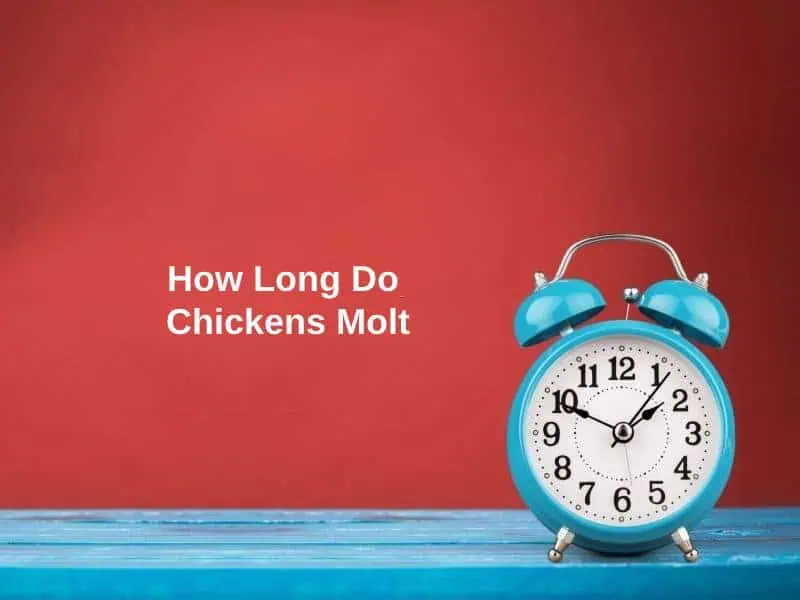Exact Answer: Up to 12 weeks
Molting happens when the chickens shed their old feathers for allowing the growth of new feathers. The molting stage would last for around 12 weeks. The molting time will not be the same for all the chickens. Most of the chickens could go through the molting phase during the winter season.
During fall, when the sunlight is very less visible, the chicken would molt for 10 to 12 weeks. The chicken would molt to get good quality feathers to survive the heavy winter. The chickens wouldn’t lay eggs when they are molting. They will give all the energy to the regrowth of the best quality feather.
The feather regrowth happens once in the whole year. When the chicken becomes 17 or 18 months old, the chicken would face the first molting stage of life.

How Long Do Chickens Molt?
| Chicken Molt | Time |
| In weeks | 12 weeks |
| In days | 84 days |
Many of the chickens would see the regrowth of the feathers in just 8 to 10 weeks. There will be some chickens who would see the loss and regrowth of feathers taking around 16 weeks. The age of the birds would affect how long the molting process would take to complete. The feather of the chicken plays a vital role in protecting their body.
The molting process is very natural to happen and this requires no medical help. Sometimes, the molting of chicken may occur once in 24 months. Some chickens may see the molting of feathers twice every 12 months. The chicken at a young age would see few partial molting periods.
After the chicken reaches maturity, the chicken would see the molting process coming in a uniform manner every year. During the molting period, the chicken is supposed to take high-quality food for being healthy. The chicken needs nutrients even if they are not laying eggs.
As they need to maintain their health for getting good quality feathers. Fatigue can also cause molting in chicken. Sometimes, molting may happen due to excess activities or physical exhaustion. The bodyweight of the chicken plays a big influential role in determining the length of the molting period.
The chicken who has less bodyweight than the requirement would see severe feather loss. If the feeding time of the chicken is reduced then the nutrient content would decrease as well. This will cause the chicken to have poor-quality feathers after the molting period. Protein is one of the most important nutrients that chicken needs for growth.
The feather of the chicken would grow properly if the protein content in the body is as per requirement. The protein content in feathers would lose when the molting period would start. If the chicken doesn’t get the required amount of protein, then it would not allow the chicken to lay good quality eggs.
The feather production would also get affected due to no protein available for the formation of a feather.
Why Do Chicken Molt For This Long?
If the bird is stressed then the molting process can happen in any month of the year. Internal parasites can also cause frequent molting in chickens. Many chickens see feather loss due to excessive cold climate. Heatwaves can also induce the molting process in chicken.
The health of the chicken needs to be maintained for avoiding feather loss very frequently. The owners should give all the required nutrients to the chicken to prevent the loss of feathers for a long time. The molting period would stay for a long time in chickens who have less body weight and are unhealthy.
Insufficient or irregular feed are common reasons why the chicken can unexpected molting period for more than 12 weeks. The molting process would happen in chickens when they are shifted to another house by the owner. Sometimes, people may try to do force molting in the chicken so that they would be capable of laying eggs again.
Conclusion
The molting period in chickens would get affected by their lifestyle, diet, body type, and age. Sometimes, the chicken may face a long molting period due to health problems or diseases. Less water access can also turn to be a reason for the molting of chicken.
The chicken needs good space for proper ventilation. Improper ventilation would cause a long molting period.